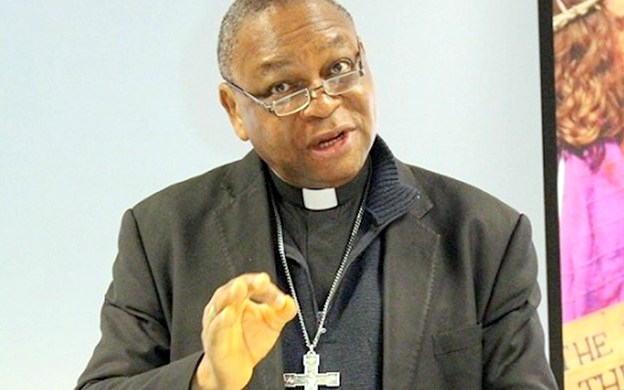Priests have a duty to remind Catholics not to receive the Eucharist in a state of serious sin and to make confession easily available, a Nigerian cardinal said at the International Eucharistic Congress on Thursday.
“It is still the doctrine of the Church that anyone who knows himself or herself to be in a state of serious sin which distances him from the love of God should not move forward to receive the Holy Communion simply because everybody is going,” Cardinal John Onaiyekan said during a live-streamed catechesis in the Hungarian capital, Budapest, on Sept. 9.
“He must first avail himself of the sacrament of reconciliation with God through confession.”
“But unfortunately, what we see is a general stream of people going for Communion at Mass, and it seems like they don’t really bother about whether they are in the right spiritual state to receive it.”
“It is the duty of pastors to remind the faithful about this, without introducing unnecessary exaggerations in the matter. It is also the duty of pastors to make access to confession easily available for the faithful.”
Cardinal Onaiyekan served as the archbishop of Abuja from 1994 until 2019, when Pope Francis accepted his retirement at the age of 75. He delivered an hour-long catechesis on Catholic doctrine on the Eucharist at the 52nd International Eucharistic Congress taking place in Hungary on Sept. 5-12.
The 77-year-old cardinal recommended that priests preach on the worthy reception of the Eucharist so that people will know when they are in an irregular situation and “will regulate their behavior without waiting to be publicly pulled out of the Communion rails.”
“There is a debate going on in some countries about whether a politician who for political reasons votes for an immoral law should be stopped from Holy Communion,” Onaiyekan said.
“If voting for an immoral law, even in a secular state, amounts to becoming an accomplice to the crime, then we would be dealing with a moral decision that is incompatible with receiving Holy Communion.”

“But from a pastoral point of view, it is not so clear whether if such a person actually presents himself at the altar rails for Communion, we should publicly refuse to give him Communion, thereby causing a major uproar and scandal. Both St. Augustine and St. Thomas Aquinas propose caution in handling such cases.”
The African cardinal added that “a Catholic politician who disagrees publicly with his Church on a moral issue should do well to avoid deliberately provoking controversy around the Holy Eucharist.”
Onaiyekan said that as a bishop he had tried his best to encourage Catholic politicians to “always stand out clearly and oppose any law that is against the law of God.”

“If, for political reasons, he is unable to stop an immoral law, he should at least be on record as having opposed it,” he added.
“A recent situation that has generated a lot of discussion has to do with the responsibility of Catholic politicians to uphold the laws of the Church in their political choices and decisions, especially with regard to the serious sin of abortion,” the cardinal said.
He lamented that abortion is considered normal in many “so-called developed nations.”

“Nevertheless, the position of the Catholic Church resolutely insisting that abortion is the killing of innocent unborn children continues to hold. Any Catholic who commits abortion, or who cooperates in the committing of abortion, should know that he has committed murder and should keep away from Holy Communion, unless and until he has gone for confession,” he said.
“It is not so difficult to get back to God, even after doing such a thing,” he added. “The problem is when people are proud of what they have done.”
Onaiyekan said that the question of whether a Catholic politician must always necessarily vote against any law that is permitting abortion or immoral action is “more delicate and problematic.”

“The important issue here is that very often, once it comes into the arena of party politics, it is necessary that the Church be careful not to drag the Holy Eucharist into political wrangling, lest more damage is done than we try to avoid,” he said.
Onaiyekan has been a bishop for 38 years and previously served as the president of the Nigerian Catholic bishops’ conference.
He said that his experience of living alongside Muslims in Nigeria who insist on the Sharia law had taught “useful lessons on how not to impose the religious laws of a faith community in a multi-religious nation.”
“I wish I had time to speak about Nigeria, and about what God is doing in our midst, but that is not my task for this morning,” he said, noting that he was asked to speak about Catholic doctrine on the Eucharist.
“In the Holy Eucharist, we have an intimate union with Jesus Christ, the Son of God the Father, through the action of the Holy Spirit. In other words, we have an intimate union with the Holy Trinity. Through the Holy Eucharist, God not only comes to us but God lives in us and we in him,” Onaiyekan said.
“We can say first and foremost that, strictly speaking, nobody is worthy to receive the Holy Communion. We are all sinners before God. That is why when, at the beginning of Mass, we recite the Confiteor — ‘I confess to almighty God’ — we must do it sincerely. It is not just a formality,” he said.
“We should thank God for admitting us into union with himself, and making us worthy to celebrate the Eucharist with him, through his mercy.”



